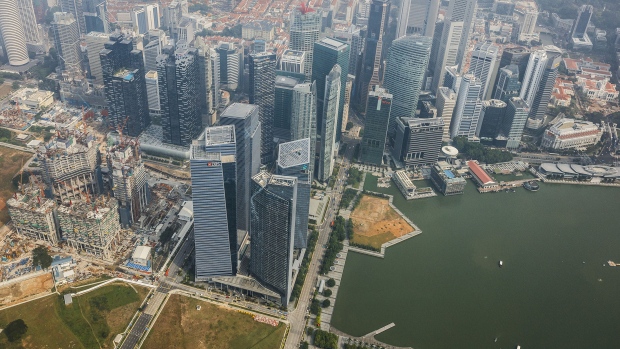Feb 18, 2019
The Winners and Losers From Singapore's 2019 Budget Plan
, Bloomberg News

(Bloomberg) -- Singapore Finance Minister Heng Swee Keat delivered a budget that included more health-care and military spending ahead of a general election that could come as early as this year.
Heng unveiled on Monday more support for the aging population, as well as measures to help local businesses and “transform” the economy for the year starting April 1. The government expects to spend S$4.6 billion ($3.4 billion) over three years to boost Singapore’s growth, he said. The Parliament will discuss the plan next week.
The finance minister opened his speech by talking about the changing global and domestic landscape and the importance of planning for the long term, while being open to diversity. Weaker demand and U.S.-China trade tensions saw Singapore’s export-reliant economy grow at a slower pace than expected in the fourth quarter.
“Budget 2019 is a strategic plan to allocate resources to build a strong, united Singapore,” he said. The city state needs to stay safe and continue to transform the nation’s economy, he added.
Here are some winners and losers from the budget plan:
WINNERS
Health-care Providers
Heng’s budget announced a slew of support measures for Singaporeans as they age, including a plan to make it more affordable for citizens to visit clinics in their neighborhood. The government expects to pay out more than S$200 million a year in Community Health Assist Scheme subsidies.
Companies that could benefit from the positive sentiment in the health-care sector include listed providers Raffles Medical Group Ltd., Thomson Medical Group Ltd. and OUE Lippo Healthcare Ltd.
Merdeka Generation
The finance minister highlighted the Merdeka Generation in his speech, referring to a big portion of the population that came of age during Singapore’s independence era in the 1960s. He announced a package that primarily includes health-care support, and said the government would set aside S$6.1 billion for a new Merdeka Generation Fund that would benefit about 500,000 citizens.
Military
He emphasized the increasingly uncertain geopolitical environment as he outlined the plan to allocate 30 percent of spending to defense, security and diplomacy efforts. While Singapore is one of the safest cities in the world, “we must not be complacent,” Heng said. Having strong armed forces remains important, he added, citing cyber and terrorist attacks as growing threats.
Local Firms
Building on the success of its startup incubator program, Singapore plans to help local companies in their journey to expand beyond the country, Heng said. The government will set aside another S$100 million to establish a co-investment fund for small and medium enterprises to help firms that are “ready to scale up.”
Creative Technology Ltd., which was cited in Heng’s speech as an example of a local entrepreneur “at the cusp of a major breakthrough,” pared losses to 3 percent from 6.3 percent.
LOSERS
Restaurants
Heng said Singapore’s reliance on foreign workers is not a long-term solution, and that the country has to calibrate policies to raise productivity. While keeping the foreign-worker quotas for manufacturing and shipping intact, companies in the services sector have to reduce the number of foreigners they hire. This could impact restaurants such as Koufu Group Ltd., Jumbo Group Ltd., Kimly Ltd. and BreadTalk Group Ltd.
To contact the reporter on this story: Livia Yap in Singapore at lyap14@bloomberg.net
To contact the editors responsible for this story: Divya Balji at dbalji1@bloomberg.net, Cecile Vannucci, Margo Towie
©2019 Bloomberg L.P.